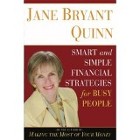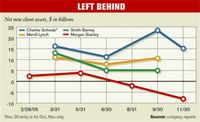
Jane Bryant Quinn claims that her new book,
Smart and Simple Financial Strategies for Busy People is not a personal finance book for "dummies," but it's fairly elementary.
In her chapter titled "Better Investing", Jane defines a few investment terms for her readers:
The market refers to the activity of buying and selling. In a bull market, prices rise. In a bear market, they go down. How do you remember which is which? In bear markets you say "Grrrr."
Geez.
But Quinn does a respectable job explaining the more basic principles of saving, debt reduction, real estate, insurance and investing. Her "No Worry" system for automatic investing is a set-it-and-forget-it approach for folks who lack the self-discipline, aptitude or inclination to spend much time with personal financial matters.
An example of the simplicity of her system, Quinn's solution for successful investing is a four or five index fund portfolio from Vanguard, T. Rowe Price or Fidelity. She even tells us exactly which funds to buy and, with only minor caveats, she recommends the same allocation for everyone.
"One size can't fit all." Maybe not, but one size can fit 95 percent of us and I'm one of that 95 percent. I suspect that you are too.
The author has little to say in favor of financial professionals. She believes that financial advisors, insurance agents and real estate brokers should be consulted only as a last resort or when things get really dicey. These slick salespeople cannot be trusted and only add unnecessary expenses.
Quinn's notion that anyone with something to sell or who earns a commission is untrustworthy is a bit troubling. Couldn't it also be extended to authors?














